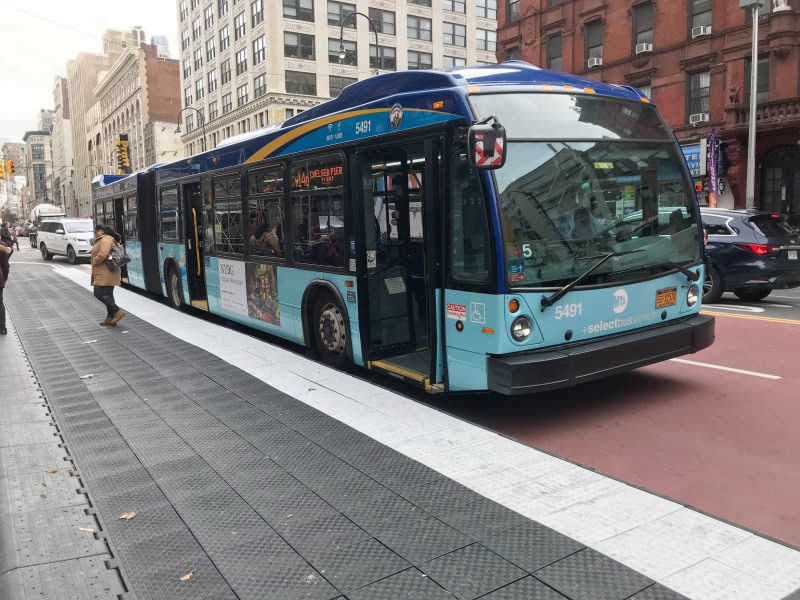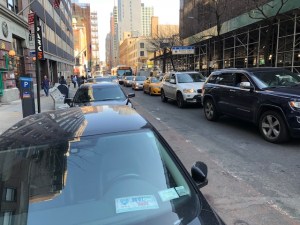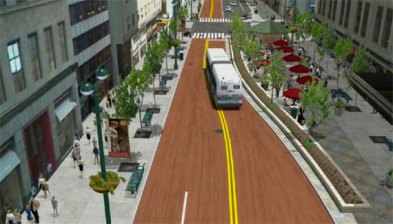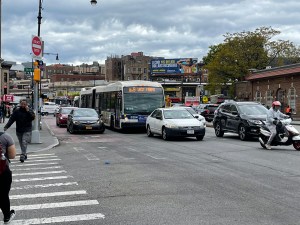Data: Busway and SBS Are the Perfect Transit Marriage


The Busway boom just keeps on going.
Ridership has been soaring since the MTA and the city created Select Bus Service on 14th Street in July — and then turbocharged it with car-free lanes in October, with double-digit percentage improvements in ridership on a route that was once known as one of the city’s worst.
In November, the first full month with busway service, ridership increased by nearly 24 percent, compared to the same month last year — before SBS and car-free dedicated lanes (see chart). Ridership during the morning rush hour is also up 20 percent.
The data pleased NYCT bus boss Craig Cipriano.

“People have the option at that rush hour to choose between walking, the subway and the bus, and they’re choosing the bus,” Cipriano said.
He chalked up the increased ridership on the bus route to the ability to let stationary cameras and the buses themselves do bus lane enforcement, since the growing number of bus lane miles in the city is becoming difficult for the NYPD to keep up with. (Of course, getting cars off 14th Street between Third and Ninth avenues certainly helps. Preliminary data show that the 14th Street buses are completing their runs 30 percent faster than before the Busway, thanks to the car-free lanes created by New York City DOT.)
The growing ridership numbers are “a demonstration that when we provide well-enforced bus priority, the buses are a good choice that people will use to get around the city,” Cipriano said.
Right now, only the B44, M15 and M14 SBS routes are using automatic bus-mounted cameras to enforce bus lane privileges for buses only. But Cipriano said that the MTA set aside $85 million more for bus lane cameras in the 2020-2024 capital plan, and that the agency is going to roll out what he promised was “a very aggressive” proposal in early 2020 for the next wave of bus cameras.
In addition to bus lane cameras, Cipriano also credited the MTA’s new “Bus lanes are for buses. Are you a bus?” campaign for helping to change the culture around blocking bus lanes. (Can’t repeat this enough: getting cars off 14th Street between Third and Ninth avenues played an enormous role in improving bus speeds, too. The city DOT has also installed raised platforms to ease rider entry, also saving time.)
To help make sure everyone is aware bus lanes are for buses, we'll be putting posters on the backs of buses to let them know. Check it out: https://t.co/61b7PObS9t pic.twitter.com/TZqGQG9DDp
— NYCT Bus (@NYCTBus) December 6, 2019
“I truly believe keeping bus lanes clear not only comes in the form of a violation, but in the form of us changing the culture of motorists in New York City,” Cipriano said. He claimed that public shunning can play a role in making drivers less of a nuisance — citing a prior concerted public effort to get drivers to stop tossing garbage out their windows, which Cipriano suggested is happening less and less.
“I know I would never consider littering out of a car, and I think this is going be a similar evolution. We’re trying to change the culture in New York City to prioritize buses, and a big piece of that is to let any bus blockers know that we need to keep these bus lanes open for the good of the city, that by keeping the lanes clear you’re doing something good for the environment and good for the city,” Cipriano said.

It’s a bit ironic considering that last week, the MTA got into a tussle with two upstate officials who were misusing the agency’s trademarked “If you see something, say something” public anti-terror campaign. Disney, of course, is one of the world’s most-litigious companies, so it is only a matter of time before the MTA gets its own “cease-and-desist” letter from Big Mouse.



